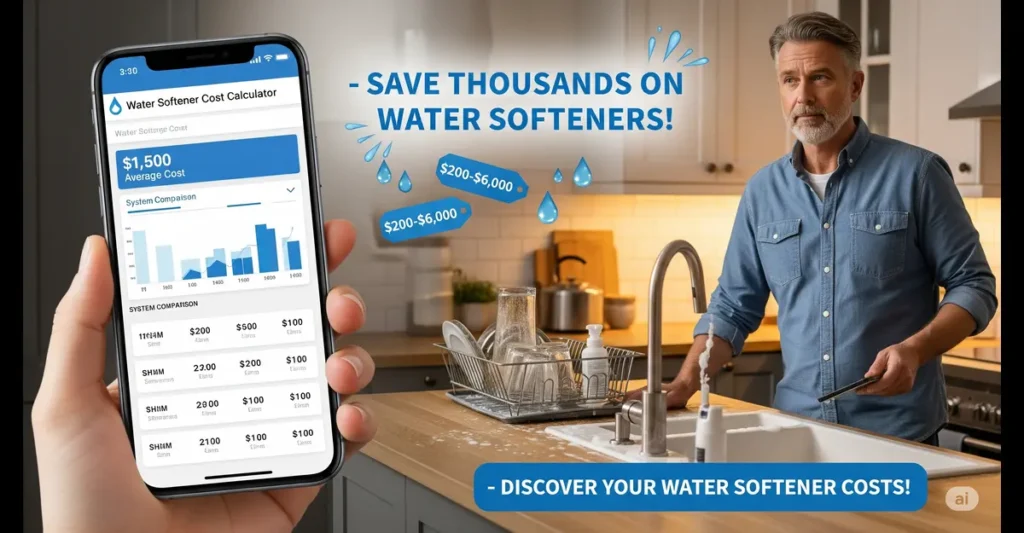
If you're tired of soap scum buildup, spotted dishes, or clothes that feel rough after washing, you're probably dealing with hard water. A water softener can solve these problems, but understanding the costs upfront helps you make the right investment for your home. Like other home improvements such as window replacements, water softeners are an investment that can improve both comfort and property value.
Water Softener Price Breakdown by Type
The type of water softener you choose has the biggest impact on your total cost. Here's what you can expect to pay for different systems:
| System Type | Equipment Cost | Installation Cost | Total Range |
|---|---|---|---|
| Salt-Based (Ion Exchange) | $500 - $3,000 | $150 - $1,000 | $1,200 - $3,800 |
| Salt-Free Systems | $800 - $4,000 | $600 - $2,500 | $1,500 - $4,500 |
| Dual-Tank Systems | $1,000 - $4,000 | $700 - $1,000 | $1,700 - $5,000 |
| Reverse Osmosis (Whole-House) | $4,000 - $8,000 | $800 - $3,000 | $4,800 - $10,000 |
Factors That Affect Water Softener Costs
Several key factors determine how much you'll spend on your water softener installation:
- Home size and water usage: Larger homes need higher-capacity systems +$500-$2,000
- Water hardness level: Extremely hard water requires more robust equipment
- Geographic location: Labor costs vary significantly by region
- Installation complexity: Existing plumbing modifications can add costs
- System features: Smart controls, WiFi connectivity, and efficiency upgrades
Installation and Additional Costs
Beyond the equipment cost, factor in these potential expenses:
- Professional installation: $150 - $1,000 for basic systems, up to $3,500 for complex whole-house installations
- Permits and inspections: $50 - $1,000 depending on local requirements
- Electrical work: $150 - $500 if you need new outlets
- Plumbing modifications: $0.50 - $8 per linear foot for new pipes
- Water testing: $100 - $300 for professional analysis
Remember that professional installation is usually worth the cost. It ensures proper setup, maintains warranties, and prevents costly mistakes that could damage your plumbing system. The Water Quality Association recommends professional installation for optimal performance and safety.
Ongoing Maintenance Costs
Water softeners have recurring expenses you should budget for:
- Salt refills: $5-$10 per 40-pound bag, typically $50-$150 annually
- Annual maintenance: $100-$300 for professional servicing
- Filter replacements: $30-$100 each (salt-free systems only)
- Repairs: $150-$900 average, can reach $2,000 for major issues
How to Choose the Right System Size
Sizing your water softener correctly prevents overspending and ensures optimal performance. Use this simple calculation:
- Test your water hardness (measured in grains per gallon)
- Calculate daily water usage (multiply household members by 90 gallons)
- Multiply usage by hardness level for daily grain removal needed
- Multiply by 3-7 days for your preferred regeneration frequency
Example: A family of 4 using 360 gallons daily with 15 grains hardness needs: 360 × 15 × 4 days = 21,600 grain capacity system.
👨🔬 Expert Review by Sakti
"As someone who has been working in the water softener industry for over a decade, I've personally tested and installed hundreds of water softening systems. My hands-on experience with these technologies gives me unique insights into what actually works in real-world applications versus marketing claims."
💼 Sakti's Professional Recommendation
"After a decade of working with water treatment systems, I've seen the evolution from basic ion-exchange units to today's smart, efficient systems. The key factors I always tell homeowners to focus on are proper sizing, quality components, and realistic maintenance expectations. Remember, proper water testing is crucial before choosing any system - it's the foundation of making the right investment."
